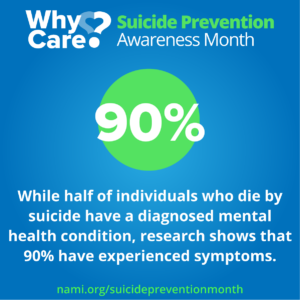Even though suicidal ideations are treatable, and suicide is preventable, suicide is the 10th leading cause of death in the United States. Men and women take their lives for several reasons, but mental illness is a factor more times than not. During National Suicide Prevention Awareness Month, it’s vital to talk about mental health and how seeking help saves lives.
The fact that Suicide Prevention Awareness Month coincides with National Recovery Month is beneficial. Addiction is a form of mental illness that often plays a role in people’s decision to end their lives. Mental health is beneficial to overall health, and encouraging people affected by mental health conditions to get the care they need is paramount.
When individuals receive evidence-based treatment, they can lead healthy and productive lives. Such people need to be made to understand that they are not alone and that others have been in their shoes. They require compassion and understanding from their communities, not stigma and shame.
Organizations like the National Alliance on Mental Illness (NAMI) work tirelessly to encourage society to care more about people with mental illness. NAMI aims to shatter the stigmas and myths that present barriers to treatment and recovery. During Suicide Prevention Month, we can all make a positive impact on those affected by mental health conditions. Your kindness, compassion, and participation are instrumental in inspiring people to reach out for support.
WhyCare? About Mental Health
One in five adults in America experiences a mental health condition in a given year, according to NAMI. One in 25 adults deals with a severe mental illness in a given year. Those who are unwilling or unable to access adequate support are at significant risk of developing unhealthy coping mechanisms. It’s not a coincidence that co-occurring substance use disorders often accompany mental illnesses like depression.
Using drugs and alcohol is just one of the harmful ways that men and women cope with mental diseases. Many will resort to self-harm to deal with their symptoms, which can progress to suicidal thoughts and actions over time. NAMI reports that 46 percent of those who die by suicide have a diagnosed mental illness. What’s more, psychological autopsies reveal that up to 90 percent of people who die by suicide have an underlying mental illness.
Sadly, too many men and women are reluctant to seek assistance for their mental illnesses or tell people about their negative thoughts. Too often, they feel cut off from society and alone; stigmas force people to keep their issues secret from their peers. Nothing good ever arises from suffering in silence. We have an obligation to combat stigmas, open up dialogues, and support those who are struggling.
NAMI’s Suicide Prevention Awareness Month WhyCare? campaign asks everyone to show that we care about people living with mental illness. The organization would like your help in disseminating stories of hope, awareness messaging, and infographics on social media. The campaign writes:
Care has the power to make a life-changing impact on those affected by mental health conditions. Through our own words and actions, we can shift the social and systemic barriers that prevent people from building better lives.
Suicide Prevention Awareness Month: You Are Not Alone
If you are in recovery from mental illness or are a suicide survivor, NAMI has created two safe, moderated spaces for sharing stories and creative expression. You Are Not Alone and OK2Talk are vehicles for men and women to inspire others with similar experiences.
Your encouragement and support let people who need help know that they are not alone. You are welcome to share your experience anonymously via several mediums, including poetry, song lyrics, inspirational quotes, drawings, photos, and videos.
You have an authentic voice. You can make a difference for yourself and others by sharing your experiences and perspectives. What has helped? What hasn’t? What has been most discouraging about your condition? What has given you hope? There are all sorts of things you know that other people want to know—you are not alone. Let them know that they aren’t either.
Orange County Mental Health Program for Men
At PACE Recovery Center, we help adult men recover from mental health disorders. Please contact us today if you or someone you care about is struggling with mental illness. Our highly credentialed clinical staff assists clients in identifying specific recovery goals and achieve their goals while preparing for productive, independent living.
If you or someone you know is in crisis, call The National Suicide Prevention Lifeline at 800-273-TALK (8255) or text NAMI to 741741 or call 911 immediately.



